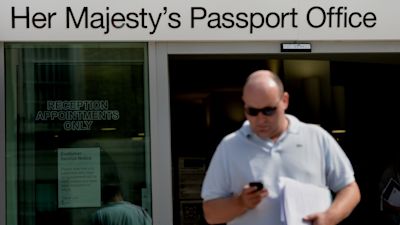Passport delays could mean holidaymakers forced to cancel half-term trips

ITV News Consumer Editor Chris Choi reports on the holiday heartache faced by some as severe delays affect passport applications.
Holidaymakers could be forced to cancel trips abroad planned for the upcoming school half-term amid chaos at the Passport Office which is causing severe delays in the processing of documents.
Deputy Prime Minister Dominic Raab said the UK would do "everything we can" to speed up the process but he could not guarantee, when asked, whether people would not be forced to cancel flights.
Brexit changes to European travel rules and more people applying for passports to go away following the coronavirus pandemic is causing a surge in demand, with processing often failing to meet the ten-week target.
The Passport Office had an average turnaround time of three weeks before the pandemic but people are now being advised to allow up to ten weeks - but that is "routinely being failed," according to SNP home affairs spokesman Stuart C McDonald.
Mr Raab said: "We've got pressures in various bits of public administration, a result of the pandemic, backlogs have accrued."
But Home Office ministers are "doing everything that they possibly can to get those applications processed as quickly as possible".
With the upcoming half-term school holidays just over a month away, people who need to renew their passports before flying at the end of May will be seriously concerned.
Asked by Political Reporter Shehab Khan whether he can guarantee no one will be forced to cancel trips or be stranded as a result of the chaos, Mr Raab said: "We'll do everything we can to support people, whether its people applying for driving licenses, whether people are applying for passports, to get them what they need as quickly as possible."
Raab is asked if people could be forced to cancel holidays due to the delays:
Home Office minister Kevin Foster told MPs the department had dealt with one million passport applications last month alone.
"To put that into context, we usually deal with seven million in a whole year," he added.
"This is a very, virtually unprecedented surge in demand, and if people are planning to travel this summer we would advise them to get their application in as soon as possible.”
Some families have been facing heartbreak as their passport applications are delayed, preventing them from travelling.
The Commons heard of one woman who has waited more than five months to receive her daughter’s new passport, with services branded “either really very good or an absolute shambles”.
The SNP's Mr McDonald said: “All our constituents are having to cancel holidays, miss funerals, rearrange visits."
What are the changes to EU travel rules caused by Brexit?
When the UK was a member of the EU, British passports remained valid up to and including their expiry date for travel to other EU countries.
But post-Brexit, British passport holders wishing to travel to EU countries in the Schengen Area are treated as non-EU nationals. This includes popular tourism destinations such as Portugal and Greece.
As such, they must meet two key requirements, as outlined on the EU's Your Europe website. If you are a non-EU national wishing to visit or travel within the EU, you will need a passport:
valid for at least three months after the date you intend to leave the EU country you are visiting
which was issued within the previous 10 years
This means you should really be looking at the date of issue when checking if you need to renew, as well as the expiry date.
It may appear that your passport is within date, but if it hasn't been issued in the past 10 years you could be stopped from boarding your plane.